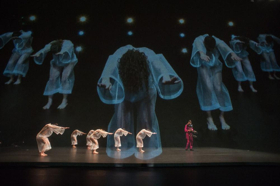Review: TESSERACT, Barbican Theatre

![]() We'll come to the question "What is Tesseract?" in a moment, but let's start with "What is a tesseract?" As the helpful programme points out, a tesseract is a four-dimensional cube - cubes within cubes.
We'll come to the question "What is Tesseract?" in a moment, but let's start with "What is a tesseract?" As the helpful programme points out, a tesseract is a four-dimensional cube - cubes within cubes.
While adding dimensions in mathematics is a breeze - for those who know, natch - it's rather more tricky in art (though the recent Amazon Prime series, The Man In The High Castle, unapologetically moved between different realities as time slipped between the three spatial dimensions). Indeed, science fiction is cited as an inspiration, the granddaddy of the genre, Robert A. Heinlein, getting a name check or two in the account of the show's origins.
Tesseract begins with a 3D film for which one dons the glasses and space bends before our very eyes. The dancers move in and through the space, sometimes appearing in Martian landscapes and sometimes appearing like the long lost siblings of Sheila B Devotion or pre-Phantom Sarah Brightman. Sometimes they (and time) runs forwards and sometimes they (and time) runs backwards, those mathematically equations equally happy either way.
The filmic aspect continues in the second half, as a man dons a steadicam to record the dance, his silken suit in brightest cranberry marking him amongst the performers' white garb. Soon he's seduced by the dance and joins, but later remembers his role and loads up the technology to record again, but this time with the new knowledge only participation can bring.
The dancers move first in squares, describing the cube in our space, but, once the filming starts and they're seen not just on stage but also semi-transparently projected on to a screen that shrouds the front of the space, that comforting geometric rigidity collapses and (as with Schrödinger's infamous cat), we're never quite sure which is the reality into which our world has collapsed.
Charles Atlas, Rashaun Mitchell and Silas Riener have created a beautiful, abstract, occasionally astonishing work that asks us questions about how we navigate through the spaces that technology creates and destroys with a (literally) inhuman disregard. Bodies are undeniably bodies, but are we looking at the person or the representation of the person? Are we looking at the now or at some moment in the past? Are we looking at a future we control or one that is foist upon us, the man in the blood red garb with the camera calling the shots?
Tesseract continues at the Barbican Theatre until 2 March.
Tesseract is a part of the Barbican Centre's Life Rewired season.
Photo Ray Felix / EMPAC
Reader Reviews
Videos

